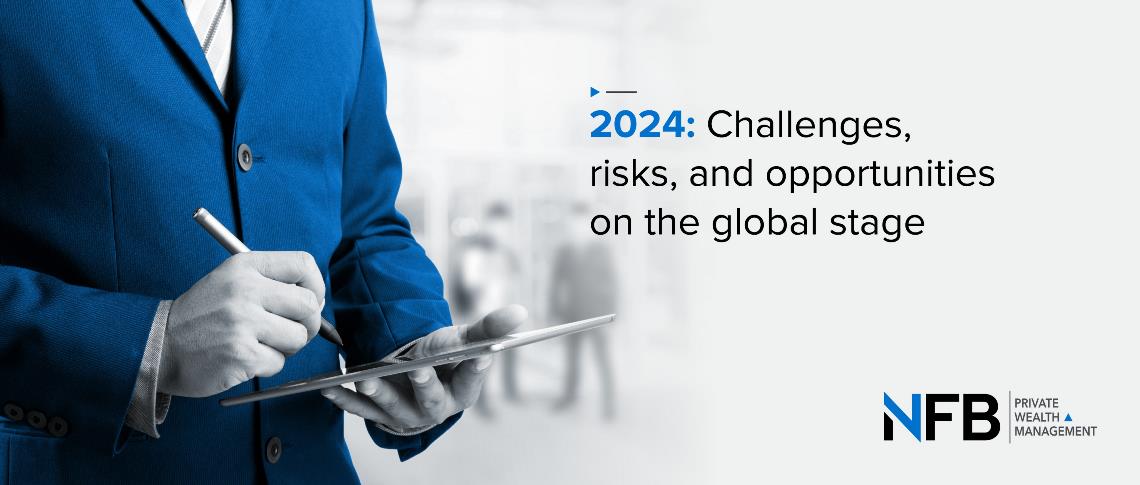2024: Challenges, risks, and opportunities on the global stage
Diving into 2024's global uncertainties and geopolitical shifts. How economics and politics shape the year ahead.


A warm welcome to everyone to the first Proficio of 2024!
By the time you read this, the year will already be in full swing, but at the time of writing, we were all most likely in the “reflecting” stage – reflecting on the year that has passed and looking forward to the year ahead.
2023 was characterised as a year in which we faced a “wall of worry”. After an extremely difficult 2022 (the impact of an inflation wave, exacerbated by the war in Eastern Europe, and then an unprecedented spike in interest rates), the median forecast for 2023 (using mainstream US banks as the forecasters and the S&P as the benchmark) was an uninspiring 5% (especially if one considers 2022 being a significantly negative year). These predictions were based on many concerning factors: a war in Eastern Europe (which turned into 2 wars as the Middle East conflict started late in the year), high interest rates, sticky inflation, slowing GDP and PMIs, immigration dislocations, pirate invasions, elevated valuations, AI mania, supply chain disruptions, falling house prices in the US and a Chinese property crisis – the “wall of worry”.
And yet, the S&P delivered 25% and global markets were significantly positive.
As we look forward into 2024, there is a new wall of worry:
- US elections are coming, and it looks likely that it will be a Trump vs Biden show down. It is likely to be a highly divisive event (and run up) and has the potential to add volatility to the globe. Whatever one’s political views are, it really is astounding that these are the best two candidates that the biggest economic and military power the world has ever seen, has to offer. One must wonder how apolitical US institutions are – and whether this will impact policies that could influence the elections. Interest rate policy comes to mind.
- It is not just the US going to the polls – half of the world’s population – and GDP – are heading to the polls at some point in 2024.
- SA also has an election. While not hugely relevant in the global context it is certainly relevant to us. With the ANC losing support over many years and with the economy stagnating, tax collection stalling, and unemployment unacceptably high, the possibility of coalition politics is very real. Markets will keenly watch how this plays out.
- The conflict in the Middle East has the potential to escalate. We saw escalating tensions in the Red Sea as the US and Allies finally engaged the Houthi Rebels, who have been causing havoc in shipping. This chaos has caused shipping rates to increase significantly (doubling in some instances) and has caused a significant amount of trade to be rerouted around Africa at great expense and delay. The risk that this poses to supply chains and consequently to inflation is very concerning.
- Inflation remains a focal point. While it certainly has come off and points towards the end of the interest rate hiking cycle, US inflation ticked up in December to 3.4%. This is still materially higher than the targeted 2% level in the US. In addition, with the risk to global supply chains as referenced above, the risk to inflation is not a thing of the past. Markets have priced in 3 rate cuts in the US (which will set the tone for the developed world) – if this doesn’t materialise there will be disappointment and consequently volatility. That said, US Treasury Secretary Janet Yelland was unusually bullish in her assessment of US job numbers on Friday, so it does seem that the US are talking up the “soft landing” narrative, and this does set the tone for interest rate cutting.
- Keep an eye on China-Taiwan issues. Taiwan had elections earlier in the year and the winner was not well received by China. Given how poorly global geopolitics have played out under the Biden administration (Russia/Ukraine, Middle East, Iran, South Korea) one wonders whether China will take the gap in the run up to the US elections (for fear of a different US foreign policy approach under Trump, should he win).
With all of the above in play, it is a natural reaction to consider exiting markets or not entering them with new investment, and rather wait for the right time to enter markets. The reality is that there will always be things to worry about. The lesson we have learnt through many market cycles is that it is very difficult, if not impossible, to time markets and one runs the risk of being stranded on the sidelines as markets move forward over time. While cash has been an acceptable place to be over the last year given relatively high interest rates (locally and globally), all indications are that these rates will begin to come down this year making the “parking bay” a less attractive place to be in as a long-term strategy.
On the SA side of things, it is hard to keep a glass half full mentality. Coming back from a trip to Dubai and Europe, the shocking state of Johannesburg really hit home – the potholes, untrimmed pavements, missing traffic lights and chevrons, and general decay are difficult to ignore. Loadshedding and now “water shedding” are being accepted as normal, when they are anything but. Without getting too political here, the impact of coalition governance in municipal management is painfully clear to see in Johannesburg specifically. One wonders how the elections will pan out and what the impact will be on already poor service delivery should the ANC be forced into a coalition arrangement.
We have for a long time been advocates of high levels of offshore exposure, and what we are seeing at a municipal level, a fiscal level and political level does nothing but reinforce this view. While this comes with its risks, our view continues to be that ignoring the very concerning economic and political risks that this country faces would be a big mistake. If one looks at returns over the last number of years, global equity has been the best performer bar none, and when converted into ZAR, has left South African assets behind by a very large margin. Last year was a challenge for investing offshore in that the ZAR weakened significantly early in the year and many investors chose to “wait for it to come back” before adding to or creating offshore diversification. The ZAR has yet to regain its composure and global markets went +20%.
As with the initial comments on markets, the same holds true to currency. It is very difficult to time markets or assets perfectly. Our view remains that defining a strategy and then investing in it, taking a long-term view and ignoring the “noise” is invariably a better approach than trying to time your way in and out of markets. Sometimes this may result in going backwards before moving forwards, but over time one tends to see the benefit of getting invested. In addition, one often finds that investment isn’t a one-off exercise. It is iterative, which in itself mitigates the timing risk issue.
2024 is going to be an interesting and important year both locally and globally. Local elections will have a profound impact on SA and the US, one feels, is at a watershed moment. While we don’t have a crystal ball, we encourage engagement and conversation and look forward to walking the investment road with you.













